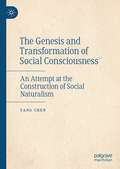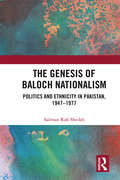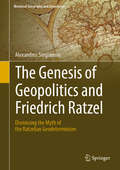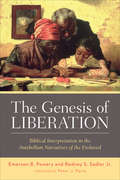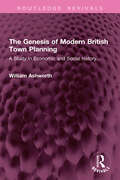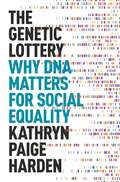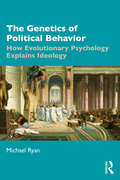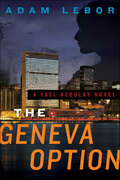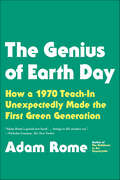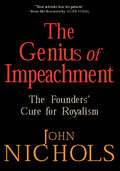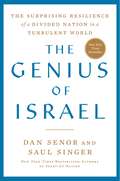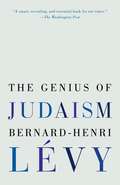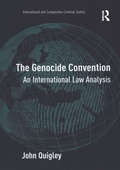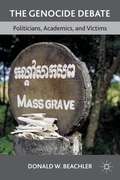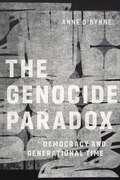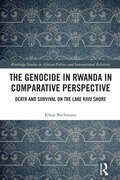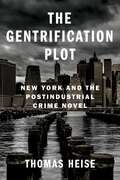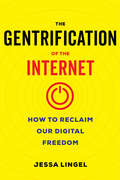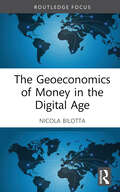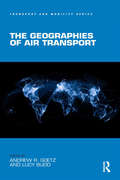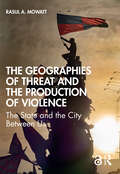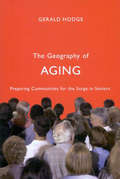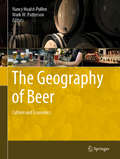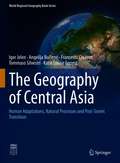- Table View
- List View
The Genesis and Transformation of Social Consciousness: An Attempt at the Construction of Social Naturalism
by Yang ChenThis book focuses on the formation of human social consciousness and develops a naturalist approach to social normativity. Beginning from Marx's uncompleted concept of social consciousness, the book retrospects the studies about collective intentionality in the area of philosophy of mind and social ontology. Specifically, a reinterpretation of social consciousness with respect to collective intentionality can offer us a new, naturalistic approach to the social formation and normativity. According to the naturalistic approach, we can discern the inner structure of social consciousness as a systematic pattern of Intentionality. Social consciousness involves three levels of development: subjective, objective and absolute. With this new pattern of social consciousness, the “naturalism” of the young Karl Marx can be revived. And by grasping the most essential ability of human Intentionality as the source of social formation, it also makes an interdisciplinary study of social philosophyand philosophy of mind possible.
The Genesis of Baloch Nationalism: Politics and Ethnicity in Pakistan, 1947–1977
by Salman Rafi SheikhThis book explores the ideological, political and military interventions of the state of Pakistan in Balochistan and traces the genesis of today’s secessionist movement. It delves into the historical question of Balochistan’s integration into Pakistan in 1947 and brings out the true political and militant character of the movement during the first three decades (1947–77) of Pakistan’s existence as a nation-state. It shows how the Baloch, as well as other minority groups, were denied the right to identify themselves as a sub-national/ethnic group in the new nation-state, compounded by a systematic exclusion from decision-making circles and structures of political and economic power. The volume also traces political resistance from within Balochistan and its subsequent suppression by military operations, leading to a widespread militant insurgency in the present day. Drawing on hitherto unexplored sources, this book will be indispensable to scholars and researchers of South Asian history, politics, international relations and area studies.
The Genesis of Geopolitics and Friedrich Ratzel: Dismissing The Myth Of The Ratzelian Geodeterminism (Historical Geography and Geosciences)
by Alexandros StogiannosThis book discusses the influence of Friedrich Ratzel's ideas in more contemporary geopolitical analytical systems and the geodeterminism commonly attributed to him. The author thoroughly analyzes the structural components of Ratzel's thought. The research is inspired by the numerous contradictory approaches in the secondary literature, presenting Ratzel as both humanist and racist, geo-determinist and multidimensional analyst, organicist and social scientist, precursor of Geopolitics and opponent to the same idea. In this work, more particular issues are approached: the establishment of a scientific Political Geography; the methodological approach of his multidisciplinary work; the redefinition of his geopolitical period; his notion of state and the evaluation of sociological and cultural parameters as factors of state power; the biogeographical content of the notion of Lebensraum; his attitude towards the racist theories as well as towards the Darwinian theories; his overall worldview and the confrontation with cosmopolitism; his contribution to an interdisciplinary, positivist and scientific approach in analyzing social and international affairs; his thoughts on the architecture of Europe. The book will be useful for researchers and students in many scientific fields, such as International Relations, Geopolitics, Geography and History of Geography.
The Genesis of Liberation: Biblical Interpretation In The Antebellum Narratives Of The Enslaved
by Emerson B. Powery Rodney S. Sadler Jr.Considering that the Bible was used to justify and perpetuate African American enslavement, why would it be given such authority? In this fascinating volume, Powery and Sadler explore how the Bible became a source of liberation for enslaved African Americans by analyzing its function in pre-Civil War freedom narratives. They explain the various ways in which enslaved African Americans interpreted the Bible and used it as a source for hope, empowerment, and literacy. The authors show that through their own engagement with the biblical text, enslaved African Americans found a liberating word. The Genesis of Liberation recovers the early history of black biblical interpretation and will help to expand understandings of African American hermeneutics.
The Genesis of Modern British Town Planning: A Study in Economic and Social history... (Routledge Revivals)
by William AshworthFirst published in 1954, The Genesis of Modern British Town Planning is a study from a historical standpoint of the social and economic factors which have made town planning one of the normal functions of government.The author begins with an examination of the rapid growth of towns in the nineteenth century and the consequent emergence of inescapable new problems of health, morality, and economic efficiency, and goes on to discuss the chief ways in which a remedy for these problems was sought in the later part of the century. Separate chapters are devoted to new model villages and towns to the spread of suburbs, and to the improvement of already established towns by means of clearance and rebuilding schemes, bye-law control, and efforts of private philanthropy. The final section of the book shows how the successes and failures of earlier attempts at reforms stimulated a demand for something more comprehensive, which found expression in the town planning act of 1909, and ends by considering the influences that brought to the town planning movement a new strength and importance in the 1930s and the war years.The author has drawn his material from a wide range of government and local authority reports, the writing of philanthropists and social workers, local guides and topographical works and the book will be of great value to those interested in social history, architecture and urban sociology.
The Genetic Lottery: Why DNA Matters for Social Equality
by Kathryn Paige HardenA provocative and timely case for how the science of genetics can help create a more just and equal societyIn recent years, scientists like Kathryn Paige Harden have shown that DNA makes us different, in our personalities and in our health—and in ways that matter for educational and economic success in our current society.In The Genetic Lottery, Harden introduces readers to the latest genetic science, dismantling dangerous ideas about racial superiority and challenging us to grapple with what equality really means in a world where people are born different. Weaving together personal stories with scientific evidence, Harden shows why our refusal to recognize the power of DNA perpetuates the myth of meritocracy, and argues that we must acknowledge the role of genetic luck if we are ever to create a fair society.Reclaiming genetic science from the legacy of eugenics, this groundbreaking book offers a bold new vision of society where everyone thrives, regardless of how one fares in the genetic lottery.
The Genetics of Political Behavior: How Evolutionary Psychology Explains Ideology
by Michael RyanIn this unique amalgam of neuroscience, genetics, and evolutionary psychology, Ryan argues that leftists and rightists are biologically distinct versions of the human species that came into being at different moments in human evolution. The book argues that the varying requirements of survival at different points in history explain why leftists and rightists have anatomically different brains as well as radically distinct behavioral traits. Rightist traits such as callousness and fearfulness emerged early in evolution when violence was pervasive in human life and survival depended on the fearful anticipation of danger. Leftist traits such as pro-sociality and empathy emerged later as environmental adversity made it necessary for humans to live in larger social groups that required new adaptive behavior. The book also explores new evolutionary theories that emphasize the role of the environment in shaping not only human political behavior but also humans' genetic architecture. With implications for the future of politics, the book explores how the niche worlds we build for ourselves through political action can have consequences for the evolution of the species. Proposing a new way of understanding human politics, this is fascinating reading for students and academics in psychology, the social sciences, and humanities, as well as general readers interested in political behavior.
The Geneva Option: A Yael Azoulay Novel (Yael Azoulay Series #1)
by Adam LeBorA gripping thriller of international espionage, The Geneva Option by Adam LeBor pits a sexy, young UN staffer against a brutal conspiracy to control Africa’s natural resources. Yael Azoulay does the United Nations’ dirty work. Sent by the UN’s Secretary General to eastern Congo to negotiate with Jean-Pierre Hakizimani, a Hutu warlord wanted for genocide, she offers a deal: surrender to the UN tribunal, in exchange for a short sentence and a return to politics. The plan is to bring stability to the region so the West can exploit the region’s mineral wealth. But Yael soon realizes that the UN is prepared to turn a blind eye to mass murder. Yael finds herself on the run, hunted by the world’s intelligence and law enforcement agencies—and haunted by her past—ultimately learning that salvation means not just saving other’s lives but confronting her own inner demons.Written by Adam LeBor, a high-profile foreign correspondent and critically acclaimed investigative journalist, The Geneva Option takes readers on a nonstop journey through the secret corridors of international power.
The Genius of Earth Day: How a 1970 Teach-In Unexpectedly Made the First Green Generation
by Adam RomeThe first Earth Day is the most famous little-known event in modern American history. Because we still pay ritual homage to the planet every April 22, everyone knows something about Earth Day. Some people may also know that Earth Day 1970 made the environmental movement a major force in American political life. But no one has told the whole story before. The story of the first Earth Day is inspiring: it had a power, a freshness, and a seriousness of purpose that are difficult to imagine today. Earth Day 1970 created an entire green generation. Thousands of Earth Day organizers and participants decided to devote their lives to the environmental cause. Earth Day 1970 helped to build a lasting eco-infrastructure—lobbying organizations, environmental beats at newspapers, environmental-studies programs, ecology sections in bookstores, community ecology centers. In The Genius of Earth Day, the prizewinning historian Adam Rome offers a compelling account of the rise of the environmental movement. Drawing on his experience as a journalist as well as his expertise as a scholar, he explains why the first Earth Day was so powerful, bringing one of the greatest political events of the twentieth century to life.
The Genius of Impeachment: The Founders' Cure for Royalism
by John NicholsA more-timely-than-ever argument that impeachment is an essential American institution from the author of Horsemen of the Trumpocalypse. This surprising and irreverent book by one of America&’s leading political reporters makes the case that impeachment is much more than a legal and congressional process—it is an essential instrument of America&’s democratic system. Articles of impeachment have been brought sixty-two times in American history. Thomas Jefferson himself forwarded the evidence for impeachment of the first federal official to be removed under the process—John Pickering in 1803. Impeachment is as American as apple pie. The founders designed impeachment as one of the checks against executive power. As John Nichols reveals in this fascinating look at impeachment&’s hidden history, impeachment movements—in addition to congressional proceedings themselves—have played an important role in countering an out-of-control executive branch. The threat of impeachment has worked to temper presidential excesses and to reassert democratic values in times of national drift. The Genius of Impeachment makes clear that we sorely need such a movement today, and that both the president and vice president deserve impeachment. In the spirit of maverick congressmember Henry B. González, who introduced articles of impeachment against both George H. W. Bush and Ronald Reagan for making war without a declaration, this book is a fearless call to Americans to hold our leaders accountable to democracy. &“Arguing that regular elections are an insufficient democratic guardian against corrupt officeholders . . . this work relies on its power-to-the-people persona for its appeal.&” —Booklist
The Genius of Israel: The Surprising Resilience of a Divided Nation in a Turbulent World
by Dan Senor Saul SingerHow has a small nation of 9 million people, forced to fight for its existence and security since its founding and riven by ethnic, religious, and economic divides, proven resistant to so many of the societal ills plaguing other wealthy democracies?Why do Israelis have among the world&’s highest life expectancies and lowest rates of &“deaths of despair&” from suicide and substance abuse? Why is Israel&’s population young and growing while all other wealthy democracies are aging and shrinking? How can it be that Israel, according to a United Nations ranking, is the fourth happiest nation in the world? Why do Israelis tend to look to the future with hope, optimism, and purpose while the rest of the West struggles with an epidemic of loneliness, teen depression, and social decline? Dan Senor and Saul Singer, the writers behind the international bestseller Start-Up Nation, have long been students of the global innovation race. But as they spent time with Israel&’s entrepreneurs and political leaders, soldiers and students, scientists and activists, ultra-Orthodox Jews, Tel Aviv techies, and Israeli Arabs, they realized that they had missed what really sets Israel apart. Moving from military commanders integrating at-risk youth and people who are neurodiverse into national service, to high performing companies making space for working parents, from dreamers and innovators launching a duct-taped spacecraft to the moon, to bringing better health solutions to people around the world, The Genius of Israel tells the story of a diverse people and society built around the values of service, solidarity, and belonging. Widely admired for having the world&’s highest density of high-tech start-ups, Israel&’s greatest innovation may not be a technology at all, but Israeli society itself. Understanding how a country facing so many challenges can be among the happiest provides surprising insights into how we can confront the crisis of community, human connectedness, and purpose in modern life. Bold, timely, and insightful, Senor and Singer&’s latest work shines an important light on the impressive innovative distinctions of Israeli society—and what other communities and countries can learn.
The Genius of Judaism
by Bernard-Henri Lévy Steven B. KennedyFrom world-renowned public intellectual Bernard-Henri Lévy comes an incisive and provocative look at the heart of Judaism. For more than four decades, Bernard-Henri Lévy has been a singular figure on the world stage—one of the great moral voices of our time. Now Europe's foremost philosopher and activist confronts his spiritual roots and the religion that has always inspired and shaped him—but that he has never fully reckoned with. The Genius of Judaism is a breathtaking new vision and understanding of what it means to be a Jew, a vision quite different from the one we’re used to. It is rooted in the Talmudic traditions of argument and conflict, rather than biblical commandments, borne out in struggle and study, not in blind observance. At the very heart of the matter is an obligation to the other, to the dispossessed, and to the forgotten, an obligation that, as Lévy vividly recounts, he has sought to embody over decades of championing “lost causes,” from Bosnia to Africa’s forgotten wars, from Libya to the Kurdish Peshmerga’s desperate fight against the Islamic State, a battle raging as we speak. Lévy offers a fresh, surprising critique of a new and stealthy form of anti-Semitism on the rise as well as a provocative defense of Israel from the left. He reveals the overlooked Jewish roots of Western democratic ideals and confronts the current Islamist threat while intellectually dismantling it. Jews are not a “chosen people,” Lévy explains, but a “treasure” whose spirit must continue to inform moral thinking and courage today. Lévy’s most passionate book, and in many ways his most personal, The Genius of Judaism is a great, profound, and hypnotic intellectual reckoning—indeed a call to arms—by one of the keenest and most insightful writers in the world. Praise for Bernard-Henri Lévy’s Left In Dark Times “Moving and inspiring . . . Bernard-Henri Lévy, perhaps the most prominent intellectual in France today, [speaks] truth to power.”—The Boston Globe “Continually asking himself as well as others to confront the hard questions, [Lévy] produces a text that [is] highly absorbing.”—The New York Times Book Review “[Lévy’s] discussion of contemporary anti-Semitism is sophisticated, detailed and convincing.”—Los Angeles Times American Vertigo “An entertaining trip, as much in the tradition of Jack Kerouac as Tocqueville.”—The New York Times “Perceptive, pugnacious, passionate [and] exquisitely written.”—The New York Observer “It’s difficult to remember when a writer of any nationality so clearly and thoughtfully delineated both the good and bad in America. [Grade: A].”—Entertainment WeeklyFrom the Hardcover edition.
The Genocide Convention: An International Law Analysis (International and Comparative Criminal Justice)
by John QuigleyThe Genocide Convention explores the question of whether the law and genocide law in particular can prevent mass atrocities. The volume explains how genocide came to be accepted as a legal norm and analyzes the intent required for this categorization. The work also discusses individual suits against states for genocide and, finally, explores the utility of genocide as a legal concept.
The Genocide Debate
by Donald W. BeachlerNeither a case study of a particular genocide nor a work of comparative genocide, this book explores the political constraints and imperatives that motivate debates about genocide in the academic world and, to a lesser extent, in the political arena. The book is an analysis of the ways that political interests shape discourse about genocide.
The Genocide Paradox: Democracy and Generational Time
by Anne O'ByrneWe regard genocidal violence as worse than other sorts of violence—perhaps the worst there is. But what does this say about what we value about the genos on which nations are said to be founded? This is an urgent question for democracies. We value the mode of being in time that anchors us in the past and in the future, that is, among those who have been and those who might yet be. If the genos is a group constituted by this generational time, the demos was invented as the anti-genos, with no criterion of inheritance and instead only occurring according to the interruption of revolutionary time. Insofar as the demos persists, we experience it as a sort of genos, for example, the democratic nation state. As a result, democracies are caught is a bind, disavowing genos-thinking while cherishing the temporal forms of genos-life; they abhor genocidal violence but perpetuate and disguise it. This is the genocide paradox. O’Byrne traces the problem through our commitment to existential categories from Aristotle to the life taxonomies of Linneaus and Darwin, through anthropologies of kinship that tether us to the social world, the shortfalls of ethical theory, into the history of democratic theory and the defensive tactics used by real existing democracies when it came to defining genocide for the U.N. Genocide Convention. She argues that, although models of democracy all make room for contestation, they fail to grasp its generational structure or acknowledge the generational content of our lives. They cultivate ignorance of the contingency and precarity of the relations that create and sustain us. The danger of doing so is immense. It leaves us unprepared for confronting democracy’s deficits and its struggle to entertain multiple temporalities. In addition, it leaves us unprepared for understanding the relation between demos and violence, and the ability of good enough citizens to tolerate the slow-burning destruction of marginalized peoples. What will it take to envision an anti-genocidal democracy?
The Genocide in Rwanda in Comparative Perspective: Death and Survival on the Lake Kivu Shore (Routledge Studies in African Politics and International Relations)
by Klaus BachmannThis book combines social science concepts, history and transitional justice studies to examine the social dynamics, specific actors and ideologies involved in the genocide in Rwanda and examines what makes this genocide a unique case of mass violence and political transition compared with other cases of mass violence.It analyzes the conditions necessary for people to engage in intimate violence against their neighbors and family members, asking what inclines “ordinary men” (and women) to join gangs of killers and what role policies, authorities, ideologies, emotions, negotiations and material incentives play in the mobilization for mass atrocities. Comparing genocidal events elsewhere in time and location, the book provides an up-to-date overview of the 1994 events in Rwanda and offers new and surprising insights from previously inaccessible archival records, explaining how to facilitate foreign intervention in the future.This book is of key interest to scholars and students of African politics, genocide studies and more broadly to security studies, conflicts and conflict-resolution studies, decolonization studies and contemporary and comparative history.
The Gentrification Debates
by Japonica Brown-SaracinoThis series introduces gentrification and brings original perspectives on key topics in urban research to today's students in a series of short accessible texts, guided readers, and practical handbooks.
The Gentrification Plot: New York and the Postindustrial Crime Novel (Literature Now)
by Thomas HeiseFor decades, crime novelists have set their stories in New York City, a place long famed for decay, danger, and intrigue. What happens when the mean streets of the city are no longer quite so mean? In the wake of an unprecedented drop in crime in the 1990s and the real-estate development boom in the early 2000s, a new suspect is on the scene: gentrification. Thomas Heise identifies and investigates the emerging “gentrification plot” in contemporary crime fiction. He considers recent novels that depict the sweeping transformations of five iconic neighborhoods—the Lower East Side, Chinatown, Red Hook, Harlem, and Bedford-Stuyvesant—that have been central to African American, Latinx, immigrant, and blue-collar life in the city. Heise reads works by Richard Price, Henry Chang, Gabriel Cohen, Reggie Nadelson, Ivy Pochoda, Grace Edwards, Ernesto Quiñonez, Wil Medearis, and Brian Platzer, tracking their representations of “broken-windows” policing, cultural erasure, racial conflict, class grievance, and displacement. Placing their novels in conversation with oral histories, urban planning, and policing theory, he explores crime fiction’s contradictory and ambivalent portrayals of the postindustrial city’s dizzying metamorphoses while underscoring the material conditions of the genre. A timely and powerful book, The Gentrification Plot reveals how today’s crime writers narrate the death—or murder—of a place and a way of life.
The Gentrification of the Internet: How to Reclaim Our Digital Freedom
by Jessa LingelHow we lost control of the internet—and how to win it back. The internet has become a battleground. Although it was unlikely to live up to the hype and hopes of the 1990s, only the most skeptical cynics could have predicted the World Wide Web as we know it today: commercial, isolating, and full of, even fueled by, bias. This was not inevitable. The Gentrification of the Internet argues that much like our cities, the internet has become gentrified, dominated by the interests of business and capital rather than the interests of the people who use it. Jessa Lingel uses the politics and debates of gentrification to diagnose the massive, systemic problems blighting our contemporary internet: erosions of privacy and individual ownership, small businesses wiped out by wealthy corporations, the ubiquitous paywall. But there are still steps we can take to reclaim the heady possibilities of the early internet. Lingel outlines actions that internet activists and everyday users can take to defend and secure more protections for the individual and to carve out more spaces of freedom for the people—not businesses—online.
The Geoeconomics of Money in the Digital Age (Trends and Perspectives in International Politics)
by Nicola BilottaIn a more contentious world economy, where trade and finance are increasingly interlinked with economic security and geopolitical considerations, questions arise about the underpinnings of the US dollar's global leadership. For decades, the US dollar has reigned supreme, serving as a powerful tool of US foreign policy. However, history shows that currency dominance can shift with global power dynamics. Will China or another power rise to challenge the US-led system? Will the international monetary system experience a process of fragmentation, or will a new global order emerge? Will financial technology ease such a change? This book delves into the intricate web of how three forces – economic dislocation, evolving geopolitical relations and technology – could potentially foster transformations in the international monetary system. Adopting a multidisciplinary lens, it analyses the strategic elements that might compel major international powers to instigate change or solidify the current equilibrium. While there are no definitive answers on the future, the book provides readers with the key tools to understand the major factors influencing possible changes in the international finance system.
The Geographies of Air Transport (Transport and Mobility)
by Lucy Budd Andrew R. GoetzMaking a detailed contribution to geographies of air transport and aeromobility, this book examines the practices and processes that produce particular patterns of air transport provision both regionally and globally. In so doing, it updates the seminal contributions of Eva Taylor (1945), Kenneth Sealy (1957), Brian Graham (1995) and others to the study of air transport geography. Leading scholars in the field offer a unique insight into the key developments that have occurred in the field and the implications that these developments have had for geography, geographers, and global patterns of past, present and future air transport. Although globalization and liberalization processes have greatly expanded the demand for air transport over the last two decades, the industry has experienced several major setbacks due to economic, security, and environmental concerns. Many of these impacts have been much more pronounced in some regions, such as North America and Europe while others, such as Asia-Pacific have not been as adversely affected. Accordingly, there is a clear need to examine these recent economic and geopolitical changes from a geographical perspective given the differentiated pattern of effects from global processes. Addressing this need, this volume opens with thematic chapters covering key topics such as the historical geographies, socio-cultural mobilities, environmental externalities, urban geographies, and sustainability of the global air transport industry, followed by regional analysis of the industry in Asia-Pacific, Latin America, Greater Middle East and Africa as well as North America and Europe.
The Geographies of Threat and the Production of Violence: The State and the City Between Us
by Rasul A MowattThe Geographies of Threat and the Production of Violence exposes the spatial processes of racialising, gendering, and classifying populations through the encoded urban infrastructure – from highways cleaving neighbourhoods to laws and policies fortifying even more unbreachable boundaries. This synthesis of narrative and theory resurrects neglected episodes of state violence and reveals how the built environment continues to enable it today within a range of cities throughout the world. Examples and discussions pull from colonial pasts and presents, of old strategic settlements turned major modern cities in the United States and elsewhere that link to the physical and legal structures concentrating a populace into neighbourhoods that prep them for a lifetime of conscripted and carceral service to the State.
The Geography of Aging: Preparing Communities for the Surge in Seniors
by Gerald HodgeGerald Hodge uses the latest statistics to map the current and future spatial distribution of Canada's seniors and their diversity. Drawing on tested aging-environmental research and years of planning experience, he delineates the everyday geography of seniors and proposes a comprehensive framework for all communities - large and small, urban, suburban, and rural - that will allow them to respond to the needs of a rapidly aging population while recognizing the importance of maintaining the independence of their seniors.
The Geography of Beer: Culture and Economics
by Mark W. Patterson Nancy Hoalst-PullenThis book builds on the highly successful Geography of Beer: Regions, Environment, and Society (2014) and investigates the geography of beer from two expanded perspectives: culture and economics. The respective chapters provide case studies that illustrate various aspects of these themes. As the beer industry continues to reinvent itself and its economic and cultural geographies, this book showcases historical, current, and future trends at the local, regional, national, and international scales.
The Geography of Central Asia: Human Adaptations, Natural Processes and Post-Soviet Transition (World Regional Geography Book Series)
by Igor Jelen Angelija Bučienė Francesco Chiavon Tommaso Silvestri Katie Louise ForrestThis book provides a profound geographical description and analysis of Central Asia. The authors take a synthetic approach in a period of critical transformation in the post-soviet time. The monograph analyzes comprehensively the physical and human geography as well as human-nature interactions of Central Asia with focus on Kazakhstan, Uzbekistan, Turkmenistan, Kyrgyzstan and Tajikistan. Natural processes are described at a systemic scale, focusing on ecological impacts and consequences and contemporary human adaptations and organization. It also discusses in which ways the human organizations try to apply solutions for their needs such as security, territorial management and resources renewability, material and functional needs, identity elaborations, culture and communication. The Geography of Central Asia appeals to scientists and students of regional geography and interested academics from other areas such as social, political, economic and environmental studies within the context of Central Asia. The book is also a very useful resource for field trips into this area.
